| If my smile in this photograph seems slightly strained, it might not be only because I’m not sure if the self-timer on Mr A’s camera is going to work. You see, although last year was wonderful in that Inspired Quill published my third book and first short story collection, it was also the year it came home to me how hard it is to get readers, irrespective of the quality of the book. It’s hard for everyone, unless you’re a celebrity, are writing a series or have won a major prize; so should I make those my writing goals for the year to come? |
I’m joking, of course, but only half joking. Although two of those three things are beyond my control and the third beyond my comfort zone or desires, there’s a part of me that thinks I should manage the impossible to get my books into many more readers’ hands. Or should I lower my expectations, be satisfied with what I’ve got and stop being greedy for more? I am grateful for my existing reader and publisher support but I also envy writers who seem to have more luck.
My challenge for the year ahead, as I see it, is to keep moving forward while acknowledging the obstacles to ‘success’.
It’s not only in relation to plots and characters that writers inhabit a fantasy world. We need a thread of self-delusion to be able to continue knocking on doors that rarely open, to keep submitting to an industry where failure is the norm. High hopes facilitate a much-needed grit and persistence, but can also bring disappointment that needs to be managed when those hopes aren’t fulfilled. Perhaps it’s a career-long process of finding and losing the balance; I’m looking for ways of maintaining mine for the remainder of this year.
Taking stock is always grounding, reminding ourselves of why we do what we do. Although there is a risk of this post dive-bombing into a lament from Moaning Minnie, I do this because I ENJOY it. No-one’s forcing me. I do it because I like transforming an idea into a story. I like editing that story to make it better. I like it when someone reads that story and finds it a good use of their time. And, regardless of whether readers actually notice a difference, I find it extremely satisfying to see myself becoming a better writer over time. And I’m determined to continue. But how? Where should I put my energies to maximise my chances of getting closer to what I want?
What goals I set myself in this area? Anything more concrete than Keep calm and carry on? Well, I have a couple of possibly contradictory ideas in the area of writing and submitting short stories, because obviously that one collection isn’t enough! I’ve been obsessively counting my short story publications since my first over ten years ago and it currently stands at eighty-five. With three more in the offing (two very short re-writes of Rodeo entries) from a flurry of submissions during December, I’d like to make my century by the end of this year. So here’s my goal:
Now, you probably recognise that’s not a particularly smart goal since, while it’s up to me how much I submit and whether those submissions are the best they can be, acceptance is outside my control. Since I’m not going to self-publish, or count the unvetted 99-word stories at the Carrot Ranch, my fate is in the magazine editors’ hands. But, hey, that’s the advantage of not having a huge number of readers. If I fail, it will only be before my friends.
My second short story goal, while SMART in business-speak, is not very smart as it militates against the success of the first. In addition to sending some stories to the smaller magazines and competitions, others will go to the biggies, where they’re likely to be dismissed out of hand. But I feel I ought to try.
In some ways, knowing the odds are against me – although, unfortunately I can’t smother my dreams – removes some of the pressure. And, as has been said about climbing mountains, I’m motivated less by the prospect of scaling the summit, but because it’s there. And because it’s available to me: while high submission costs might reduce the chances of my novels being entered for literary prizes, let alone winning one, short story competitions are more democratic and a couple, albeit open only to book-published authors, are free. You can rest assured that in the unlikely event that I’m shortlisted for one of them I’ll be shouting about it here. (And of course I’ll be a very minor celebrity for about five minutes, and the aims articulated in this post’s heading would flip from fantasy to real.)
But I don’t only write short fiction, as you will know. I’ve a couple of other novels in the pipeline which I’ve mentioned here now and then. While things are progressing, albeit slowly, with both Matilda Windsor Is Coming Home, about a brother and sister separated for fifty years against the backdrop of the longstay psychiatric hospital closures, and Snowflake, about a teenager with a noise phobia in a dystopian society, I definitely won’t be publishing a third novel in 2019. I’m not setting any novel-writing targets, but
A publicity plan, before I even have a publication plan? Well, I’m either getting wise to the mechanics of this business or I’m heavily into precrastinating (and, yes, I spelt that correctly) because I started it in the autumn, as I was developing my marketing plan for my short story collection, Becoming Someone. Right now, it’s nothing more than a list of ideas and links but, while I struggle with promotion as much as any author, I love this novel and want it to thrive in the world.
But still, a publicity plan? Wasn’t this post about my writing goals? But if part of my motivation for writing is to be read – and it is – then I need to take this aspect as seriously as character, plotting and the elegance of my prose. Reaching readers takes more than writing a good book. Unless, as seems increasingly unlikely, I were to land a five-figure deal with a prominent publisher, it’s especially important for my kind of fiction and the responsibility for making it happen is going to lie primarily with me.
What’s the issue with my kind of fiction? Well, while I love to please readers, I’m inspired by what’s inside me and I don’t write what’s easiest to sell. Unfortunately, selling has little to do with how much readers will enjoy it once it’s brought to their attention, but how easy or difficult it is to summarise what it’s about. I shouldn’t be surprised, my favourite reads of last year all provided a little more than I expected, something that was repeatedly said of my debut novel, Sugar and Snails.
High-concept fiction isn’t necessarily the best but what’s easiest to promote and sell.
I must admit that when I first came across the term, I thought that I read and wrote high-concept fiction. But it turns out it isn’t referring to fiction that’s somehow lofty, or willing to tackle serious issues (even if in a light-hearted way). Think of the high in high concept as up in the sky, looking down on the story, feeling a bit light-headed with the thinner air. It’s when the premise has the capacity to excite, in only a few words. Somehow that’s not going to work for a novel where what enthuses readers is not that it’s a mystery but what that mystery is.
Where that takes me, I’m not quite sure. Which is why I’m giving myself a year to think about the implications of writing fiction that’s particularly difficult to promote in an extremely crowded market. Do I want to continue writing primarily to please myself and my existing readership? Should I reconsider routes I have previously dismissed as not for me? It seems inauthentic to write for a readership I don’t belong to and, if my heart wasn’t in it, I probably wouldn’t do it very well. But I don’t want to close down options and, who knows, I might enjoy it. So here’s a wishy-washy goal:
Much of the advice about successful self-publishing applies to inbetweenie authors too. I’ve tried to keep up, but I’m afraid I switch off at write a series. It might be the best – or even the only – way to find and keep readers, but it doesn’t hold much attraction for me. I don’t even like sequels, unless they subvert the original, like The Wide Sargasso Sea providing a more sympathetic portrait of Rochester’s wife in Jane Eyre.
But lately I’ve been wondering if there could be something in that for me personally. Something I’d enjoy writing and would capitalise on my existing interests and skills. I’ve been thinking about a therapist with her own mental health issues who gains insights into her clients’ problems when walking the Peak District and reflecting (and maybe time travelling) on the histories masked by the moorland. It’s the nearest to crime – a puzzle to solve – I can think of, and crime is popular at least. Please tell me it’s far too crazy – or too reminiscent of Alexander McCall Smith!
Crazy or not, you must agree it’s out-of-the-box thinking and I’ll probably share how it progresses here on the blog. As for blogging, that’s writing, isn’t it, but I’m fairly relaxed about blogging to please myself. But perhaps it’s no coincidence that this post has rambled a bit more than usual, after Charli reminded me that Google searches prioritise posts over 2000 words. I’ve always tried not to exhaust my readers’ patience, and consider half that an optimum length, so I’ve decided to continue blogging in much the same vein except
I hope that doesn’t scare readers away, or I spend so long composing a piece I compromise my focus on my fiction, so I’ll be interested in what you think. (I’ll say something about my reviews in a later post on my reading goals.)
When I first started blogging, as a published (and small prize-winning) short-story writer but without any books to my name, I expected it would eventually become the shop window for my books. Much as I enjoy my blog, and the connections it’s brought me, the typical reader of my books is unlikely to want to read a post a couple of times a week. An email newsletter is a much more valuable author resource and, after an annoying blip due to GDPR chaos and confusion, I’m steadily building mine. But it needs to grow more and I need to find creative ways of keeping my readership – most of whom have little interest in this blog – engaged between books, without boring them with unnecessary communications. So my final writing goal is also about promotion:
An image on the homepage and here on the blog can help to a certain extent, but most of my signups so far have arisen from contacts in the physical rather than virtual world. In the past – although not early enough in my journey as a published author – I’ve taken a sheet to events for people to write down their email addresses. But it’s better if they can subscribe themselves. As of November last year, I have a stack of attractive business cards I can distribute to prompt people to sign up. (I’ve had some rather attractive business cards before, but they were advertising specific books.) Actually, prioritising giving out these cards, rather than selling books, removes some of the pressure I feel at events when I drag home a case that’s almost as heavy as the one I took with me. Someone who chooses not to buy initially might nevertheless sign up to keep in touch.
So there you have it / them: my real but partly-influenced-by-fantasy writing and promotion goals for 2019.
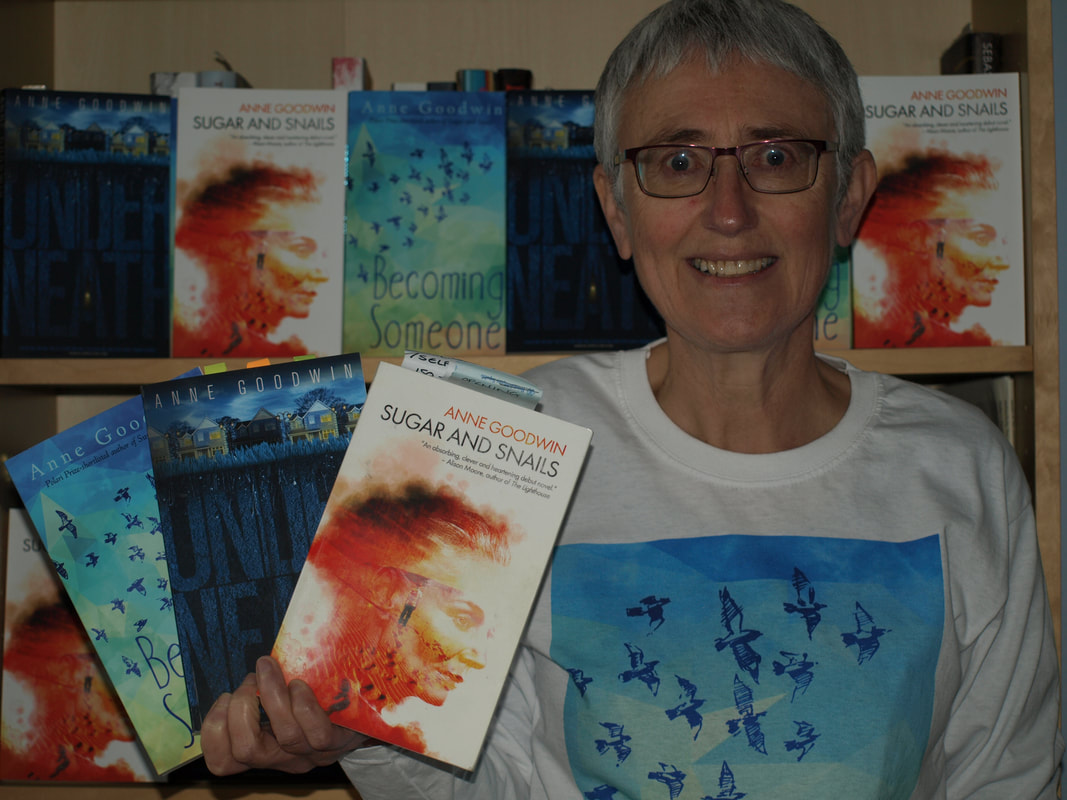
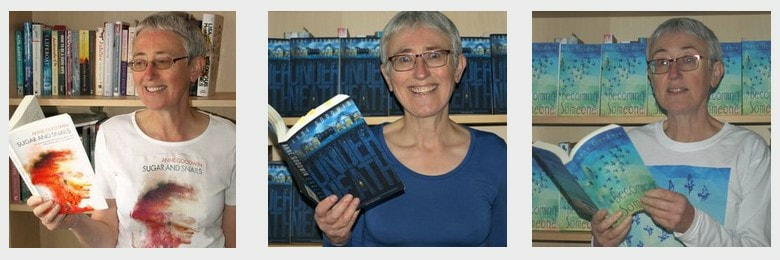
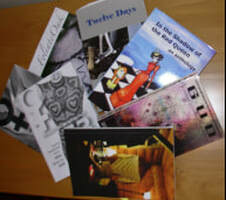

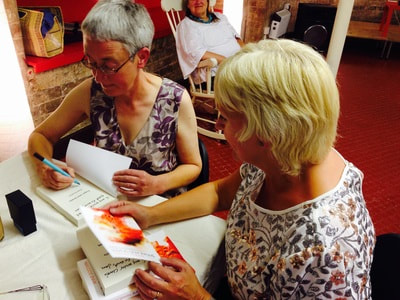


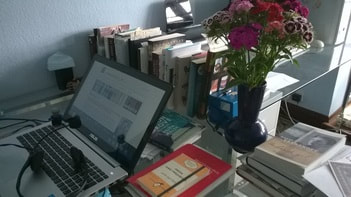
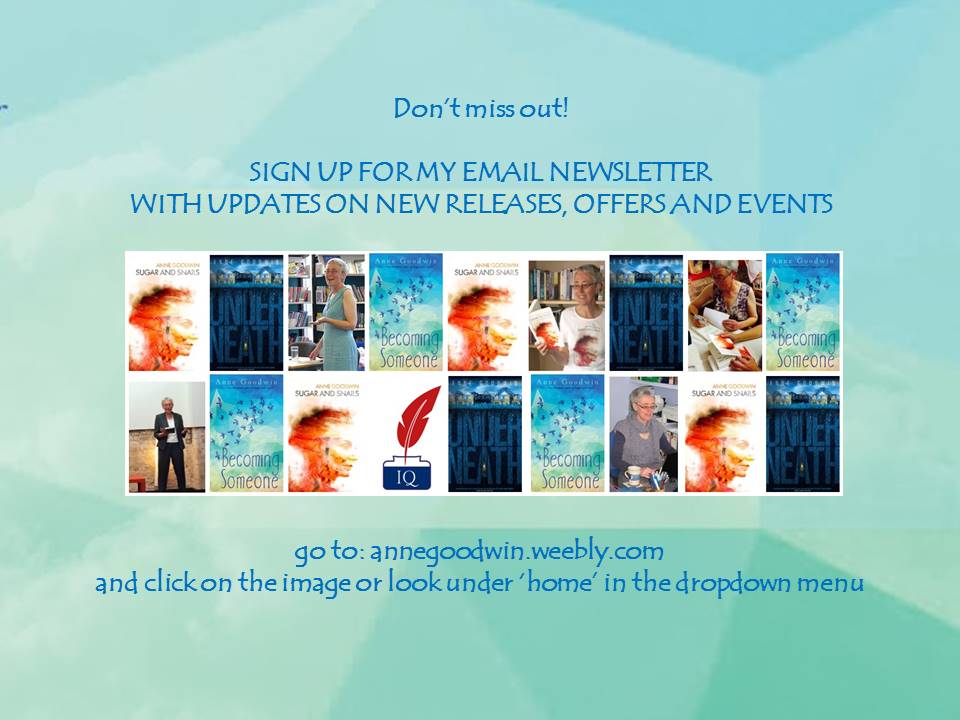





















 RSS Feed
RSS Feed





















